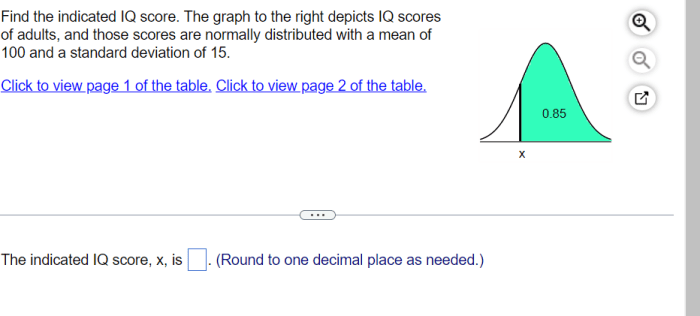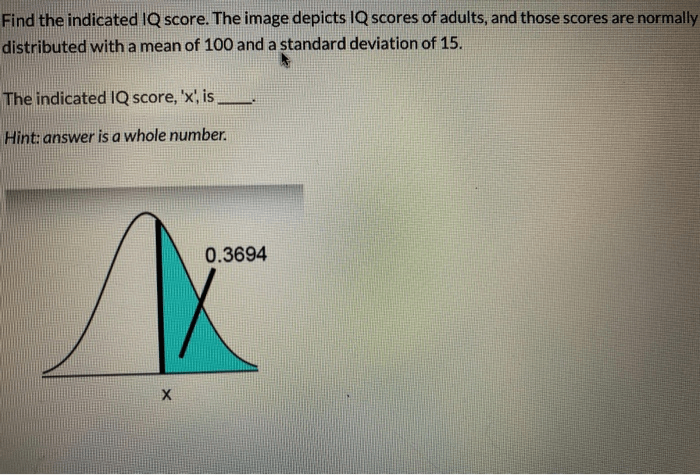The indicated IQ score X is a multifaceted concept that encompasses a wide range of implications. From its interpretation and influencing factors to its impact on academic achievement, cognitive abilities, and career success, this guide delves into the intricacies of IQ scores, providing a comprehensive understanding of their significance.
As we delve into the topic, we will explore the distribution of IQ scores within the population, analyzing patterns and trends. We will also examine the relationship between IQ scores and societal factors, including social stratification and inequality. Furthermore, we will compare IQ scores with emotional intelligence, highlighting their complementary and compensatory roles in various aspects of life.
IQ Score Interpretation: The Indicated Iq Score X Is

IQ, or Intelligence Quotient, is a measure of cognitive abilities and problem-solving skills. It is typically assessed through standardized tests that evaluate various cognitive domains, such as verbal comprehension, perceptual reasoning, working memory, and processing speed.
IQ scores are generally interpreted within a range of 0 to 200, with the average score being 100. Scores below 70 may indicate intellectual disability, while scores above 130 are considered gifted or highly intelligent.
IQ Score Ranges and Cognitive Abilities
- Below 70:Intellectual disability, difficulty with everyday tasks and learning.
- 70-85:Borderline intellectual functioning, may face challenges in academic settings.
- 85-115:Average intelligence, able to perform most tasks and learn effectively.
- 115-130:High average intelligence, excel in academic pursuits and problem-solving.
- 130-145:Gifted or highly intelligent, demonstrate exceptional cognitive abilities.
- 145-160:Profoundly gifted, possess extraordinary intellectual capabilities.
- 160-175:Exceptionally gifted, display remarkable cognitive talents.
- Above 175:Rarely encountered, indicate profound intellectual abilities.
Factors Influencing IQ Score
An individual’s IQ score is influenced by a complex interplay of factors, including genetics, environment, and culture. Understanding these factors is crucial for interpreting IQ scores and acknowledging their limitations.
Genetic Factors:
- Genetics plays a significant role in determining an individual’s cognitive abilities, including IQ. Studies have shown that heritability, or the proportion of IQ variance attributable to genetic factors, ranges from 40% to 80%.
- Specific genes have been identified as influencing IQ, such as those involved in neurodevelopment, synaptic plasticity, and cognitive processing.
Environmental Factors:
- Environmental factors also have a profound impact on IQ scores. Early childhood experiences, such as nutrition, parental care, and educational opportunities, can significantly influence cognitive development.
- Exposure to toxins, lead poisoning, and other environmental hazards can negatively affect IQ.
- Socioeconomic status, access to healthcare, and cultural enrichment can also shape IQ scores.
Cultural Factors:
- Cultural factors can influence IQ scores through language, values, and educational practices.
- Different cultures emphasize different cognitive skills, which can lead to variations in IQ scores across cultural groups.
- Culture can also shape the way IQ tests are administered and interpreted.
IQ Score Distribution

IQ scores are not distributed evenly across the population. Instead, they follow a bell-shaped curve, known as a normal distribution.
The majority of people (approximately 68%) have IQ scores between 85 and 115. This range is considered average intelligence.
Distribution Table
| IQ Score Range | Percentage of Population |
|---|---|
| Below 70 | 2.2% |
| 70-84 | 13.6% |
| 85-115 | 68.2% |
| 116-130 | 13.6% |
| Above 130 | 2.2% |
IQ Score and Academic Achievement

IQ scores are often used to predict academic achievement, and there is a strong correlation between the two. Students with higher IQ scores tend to perform better in school, while students with lower IQ scores tend to perform worse.
There are several reasons for this correlation. First, IQ scores measure a variety of cognitive skills that are important for academic success, such as reasoning, problem-solving, and memory. Second, students with higher IQ scores are more likely to be motivated to learn and to succeed in school.
Finally, students with higher IQ scores are more likely to come from families that value education and provide them with the support they need to succeed.
Evidence Supporting the Correlation
There is a large body of research that supports the correlation between IQ scores and academic achievement. For example, a study by the National Bureau of Economic Research found that students with higher IQ scores were more likely to graduate from high school and college, and to earn higher incomes.
Another study by the University of California, Berkeley found that students with higher IQ scores were more likely to be accepted to selective colleges and universities, and to earn higher grades in college.
IQ Score and Cognitive Abilities
Individuals with high IQ scores often exhibit exceptional cognitive abilities, which contribute significantly to their overall intellectual functioning.
The indicated IQ score x is a measure of your cognitive abilities. If you’re looking to enhance your cognitive skills, consider taking a curso de CNA en español . This course will provide you with the knowledge and skills you need to excel in the healthcare field.
The indicated IQ score x is a valuable indicator of your potential for success in this field.
Verbal Comprehension
- Strong vocabulary and language skills
- Ability to understand and express complex ideas
- Excellent reading and writing abilities
Perceptual Reasoning
- Advanced spatial reasoning skills
- Ability to identify patterns and relationships
- Strong problem-solving abilities
Working Memory
- Ability to hold and manipulate information in short-term memory
- Essential for complex cognitive tasks
- Supports attention, reasoning, and decision-making
Processing Speed
- Rapid and efficient information processing
- Enables quick decision-making and problem-solving
- Important for timed tests and demanding tasks
IQ Score and Career Success

IQ scores may influence career outcomes, but the relationship is complex and influenced by various factors. Individuals with higher IQ scores often have a cognitive advantage, which can benefit them in certain occupations.
Occupations Favoring Higher IQ Scores
Certain occupations may favor individuals with higher IQ scores due to the cognitive demands and problem-solving skills required. These include:
Science, Technology, Engineering, and Mathematics (STEM) fields
Research, engineering, and computer programming require strong analytical and problem-solving abilities.
Healthcare professions
Doctors, nurses, and other healthcare professionals need to make quick and accurate decisions based on complex information.
Law and business
Lawyers, judges, and business leaders must possess strong reasoning, critical thinking, and communication skills.
Academia and research
Professors, researchers, and scientists require exceptional cognitive abilities for original thinking and knowledge creation.
IQ Score and Societal Factors
IQ scores have been linked to various societal factors, including social stratification and inequality. Individuals with higher IQ scores tend to have greater access to educational opportunities, higher-paying jobs, and better healthcare, leading to a socioeconomic advantage over those with lower IQ scores.
This disparity can contribute to social stratification, where individuals are ranked based on their IQ scores and other factors, resulting in unequal distribution of resources and opportunities.
Potential Biases and Limitations of IQ Scores
IQ scores are not without their criticisms. Some experts argue that IQ tests are biased towards certain cultural and socioeconomic groups, potentially underestimating the intelligence of individuals from diverse backgrounds. Additionally, IQ scores only measure a narrow range of cognitive abilities, such as problem-solving and verbal reasoning, and may not fully capture the broader spectrum of intelligence, including creativity, emotional intelligence, and practical skills.
IQ Score and Emotional Intelligence
IQ scores measure cognitive abilities, such as problem-solving, reasoning, and memory. Emotional intelligence (EI), on the other hand, refers to the ability to recognize, understand, and manage one’s own emotions and the emotions of others.
While IQ scores are important for academic success and certain cognitive tasks, EI is crucial for interpersonal relationships, emotional regulation, and overall well-being. EI can complement or compensate for IQ scores in various aspects of life.
EI Compensating for Low IQ Scores
- Social Relationships:Individuals with high EI can build and maintain strong relationships despite having lower IQ scores. They can navigate social situations effectively, resolve conflicts, and foster empathy.
- Emotional Regulation:EI helps individuals manage their emotions and respond appropriately to challenging situations. This can prevent impulsive behaviors and promote resilience.
- Career Success:In certain professions, such as those involving interpersonal interactions or emotional sensitivity, EI can compensate for lower IQ scores.
EI Complementing High IQ Scores, The indicated iq score x is
- Leadership:Individuals with both high IQ and EI make effective leaders. They can use their cognitive abilities to make sound decisions and their emotional intelligence to inspire and motivate others.
- Innovation:EI fosters creativity and open-mindedness. It allows individuals to consider different perspectives and come up with innovative solutions.
- Personal Fulfillment:High EI contributes to overall happiness and well-being. It enables individuals to build meaningful relationships, manage stress, and achieve a sense of purpose.
In conclusion, IQ scores and emotional intelligence are distinct but complementary aspects of human cognition. While IQ scores measure cognitive abilities, EI encompasses the ability to manage emotions and build relationships. By understanding the strengths and limitations of both IQ and EI, individuals can leverage their abilities to achieve success and fulfillment in various aspects of life.
IQ Score and Cultural Differences
Cultural background can significantly influence IQ scores. Various factors, such as educational opportunities, socioeconomic status, and cultural values, contribute to these differences. Cross-cultural comparisons of IQ scores are challenging due to language barriers, cultural biases in test design, and varying societal norms.
Challenges and Controversies
Cross-cultural comparisons of IQ scores face several challenges. Language barriers can distort results, as tests may not be translated accurately or may not capture cultural nuances. Cultural biases in test design can also skew results, as tests may favor certain cultural groups over others.
Additionally, varying societal norms and expectations can influence IQ scores, making direct comparisons difficult.
IQ Score and Genetic Research
Genetic research has significantly contributed to our understanding of the role of genes in IQ scores. Scientists have identified several genes and genetic variants that are associated with intelligence. These genes are involved in various cognitive processes, such as memory, attention, and problem-solving.
Genes and Genetic Variants Linked to Intelligence
Numerous studies have identified specific genes and genetic variants that have been linked to intelligence. Some of the most well-known genes include:
-
-*GRIN2B
Encodes a subunit of the NMDA receptor, which is involved in synaptic plasticity and learning.
-*CACNA1C
Encodes a subunit of the voltage-gated calcium channel, which is involved in neurotransmission and synaptic plasticity.
-*BDNF
Encodes a neurotrophic factor that supports the growth and survival of neurons.
-*CHRM2
Encodes a muscarinic acetylcholine receptor, which is involved in memory and attention.
Genetic variants, such as single nucleotide polymorphisms (SNPs), have also been associated with intelligence. For example, a SNP in the COMT gene has been linked to working memory and attention.While genetic factors play a role in intelligence, it’s important to note that they are not the sole determinants.
Environmental factors, such as education, nutrition, and early childhood experiences, also significantly influence IQ scores.
FAQ Compilation
What is a “good” IQ score?
There is no definitive answer to this question, as the interpretation of IQ scores varies depending on the specific context and purpose of the assessment.
How can I improve my IQ score?
While IQ scores are generally considered to be stable over time, there are certain activities that may help to improve cognitive functioning, such as engaging in mentally stimulating activities, pursuing education, and maintaining a healthy lifestyle.